Filter by
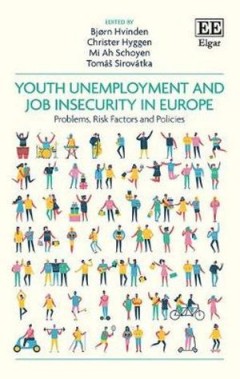
Youth Unemployment and Job Insecurity in Europe : Problems, Risk Factors and …
Providing original insights into the factors causing early job insecurity in European countries, this book examines its short- and long-term consequences. It assesses public policies seeking to diminish the risks to young people facing prolonged job insecurity and reduce the severity of these impacts. Based on the findings of a major study across nine European countries, this book examines the …
- Edition
- -
- ISBN/ISSN
- 9781788118897
- Collation
- -
- Series Title
- -
- Call Number
- 650

A Demographic Perspective on Gender, Family and Health in Europe
family; relationships; health, parenthood
- Edition
- -
- ISBN/ISSN
- 9783319723556
- Collation
- -
- Series Title
- -
- Call Number
- 330 DOB d
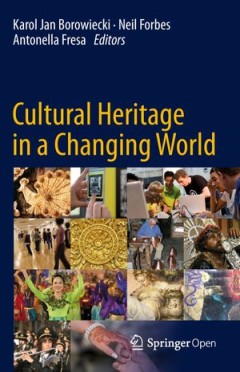
Cultural Heritage in a Changing World
Cultural Heritage; Cultural Economics; Cultural Studies; Archaeology; Information Storage and Retrieval; Information Systems Applications (incl. Internet)
- Edition
- -
- ISBN/ISSN
- 9783319295428
- Collation
- -
- Series Title
- -
- Call Number
- 301 BOR c

Contemporary Perspectives on Ageism
Older adults outnumbering children; Gerontology/geriatrics; Aging world population; The study of ageism; Ageism is the most prevalent form of discrimination
- Edition
- -
- ISBN/ISSN
- 9783319738192
- Collation
- -
- Series Title
- -
- Call Number
- 330 AYA c

Cohabitation and Marriage in The Americas: Geo-Historical Legacies and New Tr…
This open access book presents an innovative study of the rise of unmarried cohabitation in the Americas, from Canada to Argentina. Using an extensive sample of individual census data for nearly all countries on the continent, it offers a cross-national, comparative view of this recent demographic trend and its impact on the family. The book offers a tour of the historical legacies and regional…
- Edition
- -
- ISBN/ISSN
- 9783319314402
- Collation
- -
- Series Title
- -
- Call Number
- 301 COH c
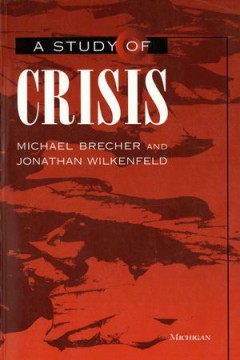
A Study of Crisis
As the twentieth century draws to a close, it is time to look back on an epoch of widespread turmoil, including two world wars, the end of the colonial era in world history, and a large number of international crises and conflicts. This book is designed to shed light on the causes and consequences of military-security crises since the end of World War I, in every region, across diverse economic…
- Edition
- -
- ISBN/ISSN
- 9780472903122
- Collation
- -
- Series Title
- -
- Call Number
- 337 WIL s
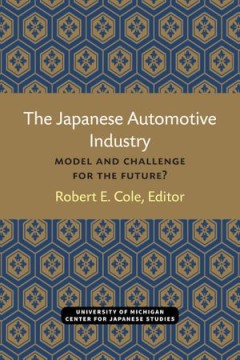
The Japanese Automotive Industry: Model and Challenge for the Future?
As the University of Michigan Center for Japanese Studies reflected on the deteriorating position of the domestic auto industry in the fall of 1980, and the strong competitive threat being posed by the Japanese automakers, we were struck by the extraordinary low quality of the public discussion of these critical issues. The national importance of the issues seemed only matched by the superficia…
- Edition
- -
- ISBN/ISSN
- 9780472902033
- Collation
- -
- Series Title
- -
- Call Number
- 300 JAP j
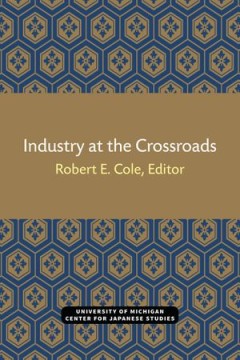
Industry at the Crossroads
International communication as a field of inquiry is, in fact, not very “internationalized.” Rather, it has been taken as a conceptual extension or empirical application of U.S. communication, and much of the world outside the West has been socialized to adopt truncated versions of Pax Americana’s notion of international communication. At stake is the “subject position” of academic an…
- Edition
- -
- ISBN/ISSN
- 9780472902040
- Collation
- -
- Series Title
- -
- Call Number
- 330 IND i
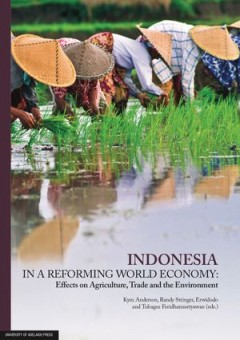
Indonesia in a Reforming World Economy : Effects on Agriculture, Trade and th…
In the mid-1990s a joint research project was established between CASER (Bogor), CIES (Adelaide), CSIS ( Jakarta) and RSPAS (at ANU, Canberra) to examine interactions between agriculture, trade and the environment in Indonesia. Funded by the Australian Centre for International Agricultural Research (ACIAR Project No. 9449), the specific objective of the project was to assess the production, con…
- Edition
- -
- ISBN/ISSN
- 9780980623871
- Collation
- -
- Series Title
- -
- Call Number
- 650

Imperial Standard Imperial Oil, Exxon, and the Canadian Oil Industry from 1880
For over 130 years, Imperial Oil dominated Canada’s oil industry. From Petrolia to Turner Valley, Imperial was always nearby and ready to take charge. Their 1947 discovery of crude oil in Leduc, Alberta transformed the industry and the country. But from 1899 onwards, two-thirds of the company was owned by an American giant, making Imperial Oil one of the largest foreign-controlled multination…
- Edition
- -
- ISBN/ISSN
- 9781773850368
- Collation
- -
- Series Title
- -
- Call Number
- 650
 Computer Science, Information & General Works
Computer Science, Information & General Works  Philosophy & Psychology
Philosophy & Psychology  Religion
Religion  Social Sciences
Social Sciences  Language
Language  Pure Science
Pure Science  Applied Sciences
Applied Sciences  Art & Recreation
Art & Recreation  Literature
Literature  History & Geography
History & Geography